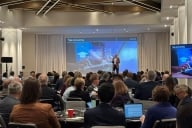You have /5 articles left.
Sign up for a free account or log in.
I spent Tuesday as part of the New Jersey Council of County Colleges delegation visiting members of Congress as part of the ACCT National Legislative Summit.
In English, that means I went from office to office, in a group, trying to convince elected representatives that community colleges are worth supporting financially. I’ll admit getting lost more than once.
Each team that visited the office of a representative or senator was a mix of presidents, trustees, students and council staff. We had been prepared with a list of talking points by the ACCT, which was helpful, but both presidents and students are known to improvise. The goal was to raise visibility and make key points on policy.
The policy points were largely what you might expect. We asked them to continue to support Pell and to pass some version of short-term Pell that would be helpful with some key workforce training programs. (Welding, for instance, doesn’t always fit cleanly into three hours a week for 15 weeks.) The Perkins funding for CTE programs got some love, too. That should have some bipartisan appeal; the programs that Perkins CTE funds—nursing, automotive, culinary—tend not to be caught up in the culture wars. They lead to jobs, which have appeal on both sides of the aisle.
No disrespect to the presidents and trustees in attendance, but the most effective advocates were the students. We had students who had overcome significant obstacles and could put a human face on a budget ask. It’s one thing to hear statistics about students in need; it’s quite another to have a student sitting right in front of you talking about her struggles and the difference that a community college has made in her life.
Maybe it’s because I’ve worked in the community college world for so long, but I sort of discounted the idea of visibility before arriving. But having heard some of these conversations, I get it now. We got questions about student loan debt that are more appropriately aimed at private four-year institutions.
Tuesday’s kickoff for the N.J. delegation was a talk from Representative Josh Gottheimer (D-N.J.). He mentioned that he frequently has conversations with employers who complain about not being able to find people with the right skills for their jobs. When he asks them whether they’ve worked with their local community college to establish a training program, the most common response is “Huh. I hadn’t thought of that.”
So maybe the point about visibility is more valid than I’d realized.
Conferences are good for reconnecting with folks from other places, too. I had an unexpected lobby reunion with a classmate from the Aspen program, which allowed us to catch up with each other and offer each other reassurance that some of our frustrations are actually valid. (That’s an underrated need.) I was recognized by a reader as I picked up my bags, which is always a hoot. But the best part had to be Monday night’s dinner with my brother and The Girl. He’s in Arlington and she’s in College Park, so we were able to grab dinner at Busboys and Poets in D.C. She’s taking a class on monster literature—Frankenstein, Dracula, that sort of thing—and he’s a monster and comic book enthusiast from way back. The dinner conversation was a blast, even if it would have driven any unlucky eavesdroppers around the bend.
I wasn’t sure what to expect on this trip, but it won me over. Members of Congress have an astonishing number of issues on their minds; they can’t necessarily spend much time on most of them. A periodic check-in and reality check can only help. And kudos to all the students; you did us proud. I still maintain that the halls of power would benefit from better signage, but that’s true generally.







